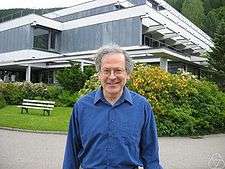Leslie Valiant
| Leslie Valiant | |
|---|---|
|
Leslie Valiant in 2005 (photo from MFO) | |
| Born |
Leslie Gabriel Valiant 28 March 1949 Budapest, Hungarian Republic |
| Nationality | United Kingdom |
| Fields |
Mathematics Computer Science |
| Institutions | |
| Alma mater | |
| Thesis | Decision Procedures for Families of Deterministic Pushdown Automata (1974) |
| Doctoral advisor | Mike Paterson[1] |
| Doctoral students |
|
| Known for | |
| Notable awards |
|
Leslie Gabriel Valiant FRS[4] (born 28 March 1949) is a British computer scientist and computational theorist.[5] He is currently the T. Jefferson Coolidge Professor of Computer Science and Applied Mathematics at Harvard University.[6][7][8][9]
Education
Valiant was educated at King's College, Cambridge, Imperial College London, and University of Warwick where he received a PhD in computer science in 1974.[1]
Research
Valiant is world-renowned for his work in theoretical computer science. Among his many contributions to complexity theory, he introduced the notion of #P-completeness to explain why enumeration and reliability problems are intractable. He also introduced the "probably approximately correct" (PAC) model of machine learning that has helped the field of computational learning theory grow, and the concept of holographic algorithms. His earlier work in automata theory includes an algorithm for context-free parsing, which is (as of 2010) still the asymptotically fastest known. He also works in computational neuroscience focusing on understanding memory and learning.
Valiant's 2013 book is Probably Approximately Correct: Nature's Algorithms for Learning and Prospering in a Complex World (Basic Books, ISBN 9780465032716). In it he argues, among other things, that evolutionary biology does not explain the rate at which evolution occurs, writing, for example, "The evidence for Darwin's general schema for evolution being essentially correct is convincing to the great majority of biologists. This author has been to enough natural history museums to be convinced himself. All this, however, does not mean the current theory of evolution is adequately explanatory. At present the theory of evolution can offer no account of the rate at which evolution progresses to develop complex mechanisms or to maintain them in changing environments."
Career
Valiant started teaching at Harvard University in 1982 and is currently the T. Jefferson Coolidge Professor of Computer Science and Applied Mathematics in the Harvard School of Engineering and Applied Sciences. Prior to 1982 he taught at Carnegie Mellon University, the University of Leeds, and the University of Edinburgh.
Books
- Valiant, Leslie (2013). Probably Approximately Correct
- Valiant, Leslie (2000). Circuits of the Mind
Awards and honors
Valiant received the Nevanlinna Prize in 1986, the Knuth Prize in 1997, the EATCS Award in 2008,[10] and the ACM Turing Award in 2010.[11][12] He is a Fellow of the Royal Society (London), a Fellow of the American Association for Artificial Intelligence, and a member of the National Academy of Sciences (USA).
Valiant's nomination for the Royal Society reads:
| “ | Valiant has contributed in a decisive way to the growth of almost every branch of theoretical computer science. His work is concerned mainly with quantifying mathematically the resource costs of solving problems on a computer. In early work (1975) he found the asymptotically fastest algorithm known for recognising context-free languages. At the same time, he pioneered the use of communication properties of graphs for analysing computations. In 1977 he defined the notion of #P-completeness ("sharp-P") and established its utility in classifying counting or enumeration problems according to computational tractability. The first application was to counting matchings (the matrix permanent function). In 1984 Valiant introduced a definition of inductive learning that for the first time reconciles computational feasibility with the applicability to non-trivial classes of logical rules to be learned.* More recently he has devised a scheme for efficient routing of communications in a multiprocessor system. He showed that the overheads involved even in a sparse network need not grow with the size of the system. This establishes, from a theoretical viewpoint, the possibility of efficient general purpose parallel computers.[4] | ” |
Family
His two sons Gregory Valiant and Paul Valiant are both theoretical computer scientists, as faculty at Stanford University and Brown University respectively.
External links
References
- 1 2 3 Leslie Valiant at the Mathematics Genealogy Project
- ↑ Valiant, L.; Vazirani, V. (1986). "NP is as easy as detecting unique solutions" (PDF). Theoretical Computer Science. 47: 85–93. doi:10.1016/0304-3975(86)90135-0.
- ↑ Valiant, L. G. (1979). "The Complexity of Enumeration and Reliability Problems". SIAM Journal on Computing. 8 (3): 410. doi:10.1137/0208032.
- 1 2 http://royalsociety.org/DServe/dserve.exe?dsqIni=Dserve.ini&dsqApp=Archive&dsqDb=Catalog&dsqCmd=show.tcl&dsqSearch=(RefNo==%27EC%2F1991%2F35%27)
- ↑ Hoffmann, L. (2011). "Q&A: Leslie Valiant discusses machine learning, parallel computing, and computational neuroscience". Communications of the ACM. 54 (6): 128. doi:10.1145/1953122.1953152.
- ↑ Leslie Valiant author profile page at the ACM Digital Library
- ↑ Wigderson, A. (2009). "The work of Leslie Valiant". Proceedings of the 41st annual ACM symposium on Symposium on theory of computing - STOC '09. p. 1. ISBN 9781605585062. doi:10.1145/1536414.1536415.
- ↑ Leslie G. Valiant at DBLP Bibliography Server
- ↑ Valiant, Leslie (Nov 1984). "A theory of the learnable" (PDF). Communications of the ACM. 27 (11): 1134–1142. doi:10.1145/1968.1972.
- ↑ David Peleg The EATCS Award 2008 – Laudatio for Professor Leslie Valiant European Association of Theoretical Computer Science.
- ↑ Josh Fishman "‘Probably Approximately Correct’ Inventor, From Harvard U., Wins Turing Award" Chronicle of Higher Education 9 March 2011.
- ↑ ACM Turing Award Goes to Innovator in Machine Learning ACM Computing News
